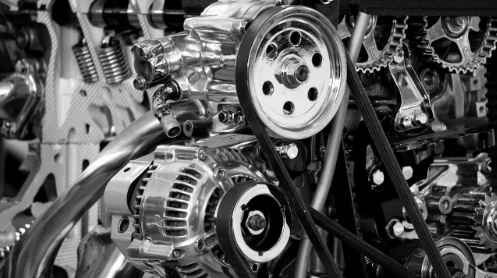Choosing the right parts can make all the difference when maintaining your vehicle, as they directly influence your car's performance, safety, and longevity. Before buying aftermarket parts to repair your car, just wait. Our team at Kirksville Motor Company put together this guide to the benefits of using genuine OEM parts and why you invest in them when repairing your car.
What Are Genuine OEM Auto Parts?
If you're in the market for car parts, you may be asking, "What are OEM parts?" or wondering how they differ from aftermarket ones.
Understanding the Distinction Between OEM and Aftermarket Parts
OEM parts are components made by the same company that produced the original parts for your car. These parts are designed and engineered to fit and function like the originals.
You may have heard about aftermarket parts as an alternative to OEM components. Aftermarket parts are produced by third-party manufacturers and are not affiliated with the vehicle's original maker. This raises the question: What does aftermarket mean for cars? Aftermarket parts replace OEM parts but may not offer the same quality or fit.
The Importance of Using Genuine OEM Parts for Your Vehicle
The debate about OEM vs. aftermarket parts is common among car owners. Understanding the differences between OEM and aftermarket parts helps you decide what's best for your vehicle's maintenance.
Quality Assurance Guaranteed by the Manufacturer
Genuine OEM parts come with a quality assurance from the vehicle's manufacturer. They're built to meet strict standards and specifications, ensuring they match the original components in every aspect, meaning these parts will perform reliably and last longer.
Perfect Fit and Compatibility With Your Specific Vehicle Model
One of the main advantages of OEM parts is the fit. Since the same manufacturer makes them, they fit your vehicle model precisely. This eliminates compatibility issues with aftermarket parts, which may not align perfectly with your car's design.
Enhanced Reliability and Performance Consistency
Using OEM parts ensures your vehicle maintains its original performance levels. These parts work seamlessly with your car's existing systems, providing consistent reliability, resulting in fewer breakdowns and a smoother driving experience.
Comprehensive Benefits of Using Genuine OEM Parts
Before you decide on the parts for your vehicle, it's helpful to understand the many benefits of genuine OEM components.
Guaranteed Quality and Durability That Matches Original Specifications
OEM parts are manufactured to the same specifications as the original components. This guarantees they will perform at the same level and have the same durability. In contrast, aftermarket parts can vary widely in quality, which may lead to premature wear and the need for more frequent replacements. If you're wondering, "Are OEM parts better than aftermarket?", the answer lies in their consistent quality.
Longevity: How OEM Parts Last Longer Than Alternatives
Investing in OEM parts can save you money in the long run. Their superior quality and precise engineering mean they often outlast aftermarket alternatives. This longevity reduces the frequency of repairs and replacements, ultimately lowering overall maintenance costs. When comparing OEM vs genuine parts, it's clear that genuine OEM parts offer the longevity your vehicle needs.
Better Performance and Efficiency, Ensuring Optimal Vehicle Operation
Your vehicle was designed with specific parts to achieve optimal performance and efficiency. Replacing components with OEM parts keeps your car operating as intended, leading to better fuel efficiency, smoother handling, and improved driving dynamics.
Warranty Coverage: Protecting Your Investment in Your Vehicle
Many OEM parts come with warranty coverage from the manufacturer. Using non-OEM parts can sometimes void your vehicle's warranty, so sticking with genuine components helps keep you covered.
Preserving Vehicle Value and Integrity Over Time
Maintaining your car with OEM parts can help preserve its resale value. Potential buyers often look for vehicles that have been serviced with genuine parts, as it indicates proper maintenance. This makes your car more attractive on the used market and helps you get a better return when it's time to sell.
Addressing Common Misconceptions About Aftermarket Parts
Although aftermarket parts may appear to be a cost-effective solution, there are often misunderstandings about their quality and performance.
Cost Savings vs. Long-term Investment in Quality
While aftermarket parts might seem cost-effective initially, they can cost more over time. Their lower quality may lead to frequent replacements and repairs. Investing in OEM parts is a smarter long-term decision, offering better value through durability and performance.
Tackling the Myth of "Just as Good" With Real Performance Data
Some believe aftermarket parts are "just as good" as OEM parts. However, real-world performance data often shows that non-OEM components can negatively affect your vehicle's operation. Issues such as reduced fuel efficiency, poor fit, and decreased reliability are common with aftermarket parts. So, are aftermarket parts good? In many cases, they don't meet OEM standards.
The Hidden Costs & Risks of Using Non-OEM Parts
Using non-OEM parts can introduce risks, such as compatibility problems, safety issues, and potential damage to other vehicle systems. These hidden costs can outweigh any initial savings and lead to expensive repairs.
Why Genuine OEM Parts Matter For Safety
Your safety on the road is directly linked to the quality of the parts in your vehicle. Using genuine OEM components ensures that all safety features function as intended, providing you and your passengers with the protection you need.
Impact on Vehicle Safety and Passenger Protection
Your vehicle's safety features rely on components designed to work together seamlessly. OEM parts ensure that all safety systems function correctly, providing the protection you and your passengers need. Aftermarket parts may not meet the same safety standards.
Avoiding Malfunctions and Safety Hazards With Reliable Components
Faulty or ill-fitting parts can lead to malfunctions that pose safety hazards. Choosing OEM parts reduces the risk of such issues, ensuring your vehicle operates safely and reliably.
The Unmatched Advantage of Investing in Genuine OEM Parts
Choosing genuine OEM parts is an investment in your vehicle's longevity, performance, and safety. They offer unmatched quality, perfect fit, and peace of mind that aftermarket parts can't provide. By prioritizing OEM components, you help keep your car operating at its best for years.
At Kirksville Motor Company, we understand the value of genuine parts. Our parts department offers a comprehensive selection of OEM parts tailored to your vehicle's needs. If you have questions or need help, contact us. Our team is dedicated to providing exceptional customer service and ensuring you get the right parts for your car.
Greyscale Photography of Car Engine by Mike Bird is licensed with Pexels License



